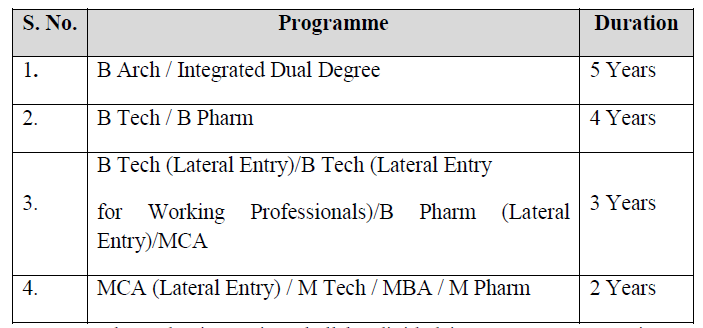DIT university grades, division, back paper exam details are explained here.
Contents
DIT University registration of students
All students shall compulsorily register in each semester/trimester/summer term for the courses to be pursued by them, as per the programme, on the dates specified in the Academic Calendar. This shall also be applicable to the students proceeding for training in a semester. Registration on time is the sole responsibility of the student.
Late Registration
Late registration by students due to any unavoidable reason are permitted by HOD on the specified dates. However, the student will not be given any concession in the attendance requirement on account of this.
DIT University system of evaluation
Evaluation of the performance of the student is done by letter grade system. The evaluation will be done through continuous appraisal of the students by the assignments, quizzes, class tests, two Mid-Term Tests and one End-Term Examination. The weightage for the various components shall be as follows:
The students should have completed 50% of the total number of experiments in a course in order to be eligible to appear in the final practical examination for a lab course.
DIT University award of grades
Students shall be awarded “letter” grades based upon their performance in examinations and their participation in the course during the semester/trimester/ Summer Term in the form of quizzes, assignments, training reports, presentations, viva voce, etc.
Based upon the overall marks obtained in a course by the student, The “Letter” grades shall be awarded. The system of relative grading shall be followed.
A student should secure a minimum of 30% marks in a course to get a passing grade in that course. Students securing 85% or more shall be awarded A+ Grade.
The students are required to re-appear in the Back Paper examination in courses where in they have obtained the ‘E’ and ‘F’ Grades.
Get to know more @ DIT University calculation of SGPA and CGPA
DIT University Duration of the Programmes
Each academic year shall consist of Two Semesters
- Monsoon Semester – July to December and
- Spring Semester – January to June
- Each Semester Shall be about 16-20 weeks duration with a minimum of 90 working days.
Maximum Duration for Completion of Programme
Maximum duration of completion of a program is given below. The student who shall be unable to complete the program within the stipulated time shall be declared Not Fit for Programme (NFP).
- Integrated Dual Degree: Eight years
- B Pharm /B Tech: Seven years
- B Pharm (Lateral Entry)/ B Tech (Lateral Entry)/ MCA: Five years
- MCA (Lateral Entry)/ M Pharm/ M Tech/ MBA: Four years
DIT University not fit for program NFP
The students who secure a CGPA of 3.0 or lower, in the first year of admission of all UG Programmes, then they shall be declared Not Fit for Programme (NFP). This is applicable only after the students have been given at least one opportunity to appear in the Back Papers. Their names will be removed from the University Rolls.
Students shall be declared Not Fit for Programme (NFP), who fail twice in the first year of their programme due to any reason. This include non-appearance of the student or having not been permitted to appear in the End Term Examinations. Their names will be removed from the University Rolls.
Get to know more@ DIT University promotion rule
DIT University award of division
Second Division: The student securing CGPA greater than or equal to ( ≥) 5.00 but less than (<) 6.5.
First Division: The student securing CGPA greater than or equal to 6.5 but is less than 8.00.
First Division with Distinction: The student securing CGPA greater than or equal to 8.00, and if the student has cleared all his/her papers in first attempt.
Back Paper/Improvement Examination
The students do not secure pass grades for courses (Theory/Practical) or missed out due to any reason, there is a provision of clearing these through Back Paper Examinations. This examination will be held during the Summer Term after paying the requisite fee.
Students who have secured pass grades in all courses but could not acquire the required SGPA / CGPA have to appear in the Back Paper Examination for some theory courses with grade ‘D’in order to meet the minimum requirement of SGPA / CGPA as specified.
The students can take the Back Paper Examination for improving their grades in maximum of two Theory Courses in an Academic Year in which they have secured the pass grade D/D+.
The students who have got E, F and I Grades will have to attend the Summer Term and appear in the Back Paper Examinations. These students will have to keep a minimum of 75% attendance in each of the courses during the Summer Term.
Students who have Back Papers in practicals are required to complete their remaining practicals during extra practical classes conducted in Summer Term. Students are required to appear in the Back Paper practical Examinations conducted during the Summer Term.
Students who have taken a break in odd semester and the students who have taken break in even semester, will have to appear in the Summer Term classes and Back Paper Examinations to qualify for promotion to next year. The students are also required to satisfy the required CGPA conditions. For these students promotion and other qualifying norms applicable shall be same as those for a regular student.
Back Paper Examinations details
- Examinations shall be conducted in the Summer Term. The schedule shall be given in the Academic Calendar.
- Students can appear in max. three Back Papers (Theory and Practical) and two ‘Improvement’ Papers in one Academic Year consisting of two semesters/three trimesters.
- The new letter grade obtained by the student in back paper examination shall replace the old letter grade only if the same is ‘better’ than the earlier grade.
Visit official website of DIT University: http://www.dituniversity.edu.in
Read Disclaimer.



